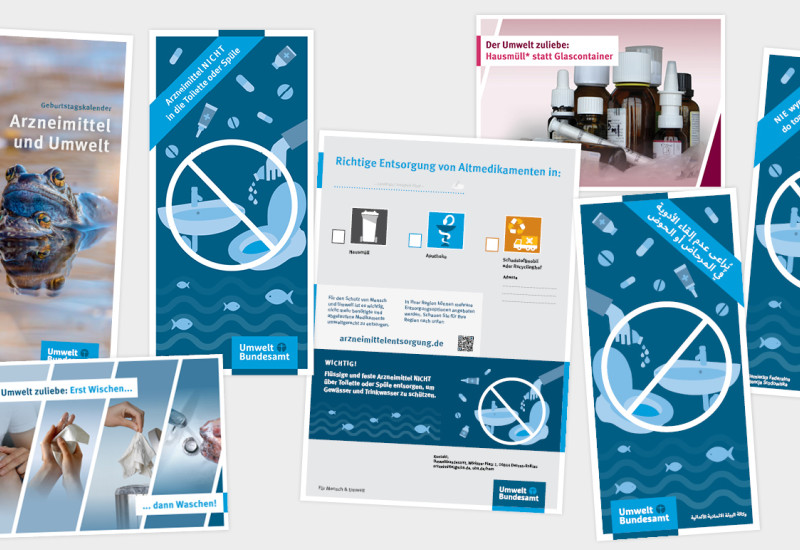Pollution of the environment by pharmaceuticals is a growing problem. Environmentally sound disposal helps to reduce their unnecessary entry into the environment. To address this issue the German Environment Agency has set up the portal ‘Pharmaceuticals and the environment.’ It provides information and recommendations for pharmaceutical and medical professionals as well as for consumers. read more
News on Chemicals
Improving the disposal of medicines
Health
Informational materials on pharmaceuticals and the environment
To support awareness efforts on the environmental impact of pharmaceuticals, the UBA has developed a range of informational materials, some of which are available in multiple languages. These include flyers, posters, postcards, and a birthday calendar, as well as free texts and images that can be used in various media channels. read more
Health
Entry, occurrence, and effects of pharmaceuticals in the environm
Residues of human medicinal products for human use enter the environment primarily through wastewater. Pharmaceutical substances are highly biologically active and can have harmful effects on living organisms, particularly in aquatic environments. read more
Health
Concepts and mitigation strategies
To ensure the long-term protection of ecosystems such as water bodies and soils, and for preventive health protection, the entry of pharmaceuticals into the environment must be sustainably reduced throughout the entire lifecycle of medicinal products. read more
Health
Entry and occurrence of human pharmaceuticals in the environment
Residues of pharmaceuticals contaminate water bodies and soils worldwide. They have also been detected in groundwater and, in some cases, even in drinking water. Human pharmaceuticals enter wastewater primarily through human excretion and then pass through sewage treatment plants into water bodies. Due to increasing pharmaceutical consumption, environmental pollution is expected to rise. read more
Health
Teaching materials on pharmaceuticals in the environment
Pharmaceutical substances in the environment are a growing concern. The UBA provides freely accessible, scientifically reviewed teaching materials for medical and pharmaceutical educators. With a basic slide set and accompanying texts, this topic can be taught in a comprehensive and practice-oriented manner, even within tight curricula. read more
Sustainability | Strategies | International matters
Dispensing drugs: Environmental aspects
By integrating environmental aspects into guideline-based counselling, pharmacy professionals can play a crucial role in reducing the entry of pharmaceutical substances into the environment. Additionally, they can contribute by conducting medication reviews, engaging in collaboration with medical professionals, and providing information on the responsible disposal of leftover medicines. read more
Sustainability | Strategies | International matters
Prescribing drugs: Environmental aspects
By integrating environmentally conscious approaches into prescribing practices, doctors can actively help reduce the entry of pharmaceuticals into the environment while ensuring high-quality patient care. read more









